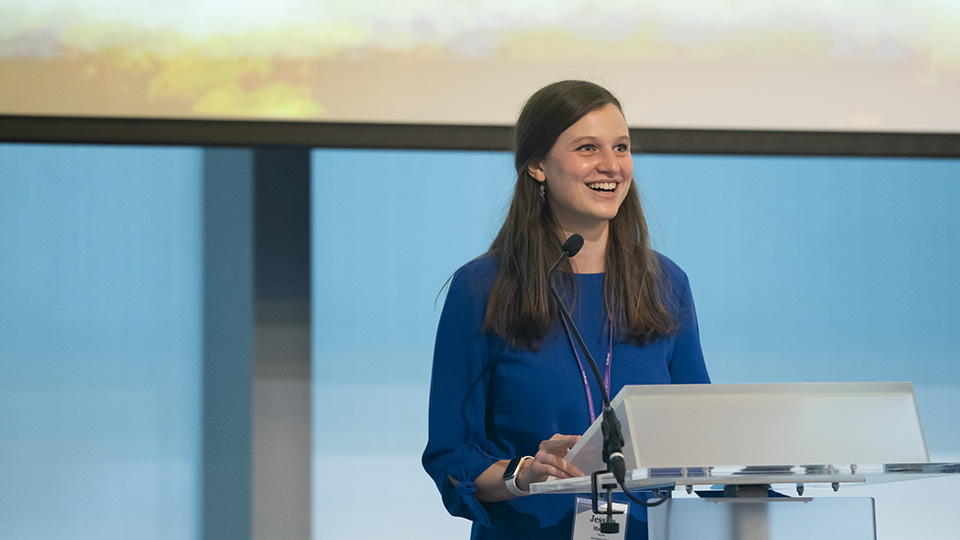It’s been just a few months since Northwestern faculty and students participated in COP26, the United Nations Climate Change Conference in Glasgow, but the need to continually engage in conversation and share ideas in the fight against climate disaster remains as urgent as ever. MBA students, as tomorrow’s business leaders, have a powerful role to play in combating climate change at the corporate level, in unison with forwarding an environmental agenda. And judging by a national conference recently hosted by the Kellogg School of Management, they have the enthusiasm and drive to do it.
The third-ever ClimateCAP Summit, held Feb. 25 and 26 at the Kellogg Global Hub, drew more than 250 MBA students from 23 business schools across the U.S. to Evanston in the name of addressing the nexus of sustainability and business, and evaluating the challenges that face an imperiled planet from a business school perspective.
“Kellogg is about leadership, and this is a leadership challenge — the challenge of our life,” said Francesca Cornelli, Dean of the Kellogg School of Management in her remarks opening the summit. “It requires creativity, adaptation, flexibility and a different way of thinking. We know that earth’s climate is changing, and in the absence of decisive action, we will have catastrophic consequences.”
Indeed, climate change represents one of the 21st century’s most important drivers of both value creation and destruction in the global economy. By 2030, global climate change impacts are projected to reach $700 billion annually, with trillions of dollars of coastal, urban and agricultural assets at risk, according to the presenters. Climate change also represents a multi-trillion-dollar business opportunity for forward-thinking business leaders, with massive new markets in technology and infrastructure solutions expanding throughout the world.
Cornelli encouraged the MBA students in attendance to think of themselves as the uniquely qualified agents of positive change for the planet — and to see and seize those business opportunities. “That’s why it’s amazing you’re all here,” she said. “I think it’s now clear that the business community and business students will play a central role. We need you if we are to successfully tackle the challenge because we need your skills.”
Kellogg faculty, teachable moments
Two prominent Kellogg faculty served as co-hosts for ClimateCAP: Megan Kashner, clinical assistant professor and director of social impact, and leader of the global impact and sustainable finance faculty consortium; and Klaus Weber, professor of management and organizations, and deputy director of the Northwestern Buffett Institute for Global Affairs. Together they moderated many of the presentations and offered thoughtful commentary that reflected on climate change in personal as well as business terms.
As he invited the MBA hopefuls in attendance to get involved, Weber offered this forward-looking perspective: “How old will you be in 2050 and where will you find yourself? Many of you will have children, as I do, and they will look at you and say, ‘Well, what did you do?’”
He paused and added: “My generation probably didn’t do enough. Don’t make that mistake.”
But there is hope, Weber stressed — and he cited the statistics back it up. The share of green talent in the workforce worldwide increased by 38.5% between 2015 and 2021. In the same period of time, employment in renewables and environment-focused jobs in the U.S. has increased by 237%. “This is clearly not just something we like to teach, but something that is an opportunity for you,” he told the attendees.
Climate challenges move to the board room
With the summit bringing those vocational and entrepreneurial dynamics into focus, ClimateCAP marked a watershed moment for Kellogg, MBA students, faculty and participating alumni. To that end, Kashner described a progression where the business world has seen the concerns progress over the years from seemingly fringe matters to critical, strategic tasks.
“The issues and challenges inherent to climate change have moved into the board room, into the investment committee, and into the norms and expectations for corporate and market strategy,” Kashner said. “Today’s MBA students know this full-well, and the students who attended ClimateCAP are putting this imperative into their future concepts for how they’ll work and lead.”
If the question is “how,” then much of this stands as uncharted territory. But a theme repeated during ClimateCAP was that Kellogg students are trained at a foundational level to answer calls like this: to disrupt, innovate and collaborate. If solutions to advance change on a worldwide level remain works in progress, Kellogg students are learning the skills to problem solve and lead businesses.
A more comprehensive version of this story can be found at Inside Kellogg.


